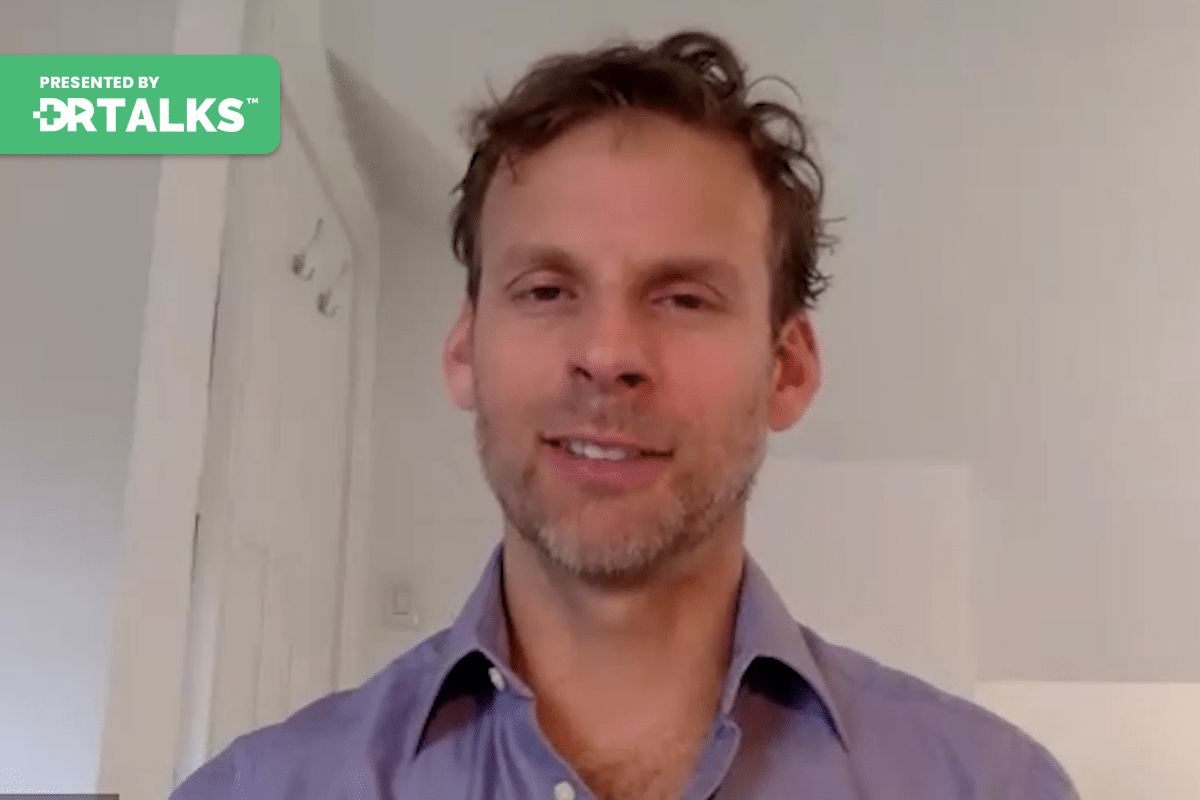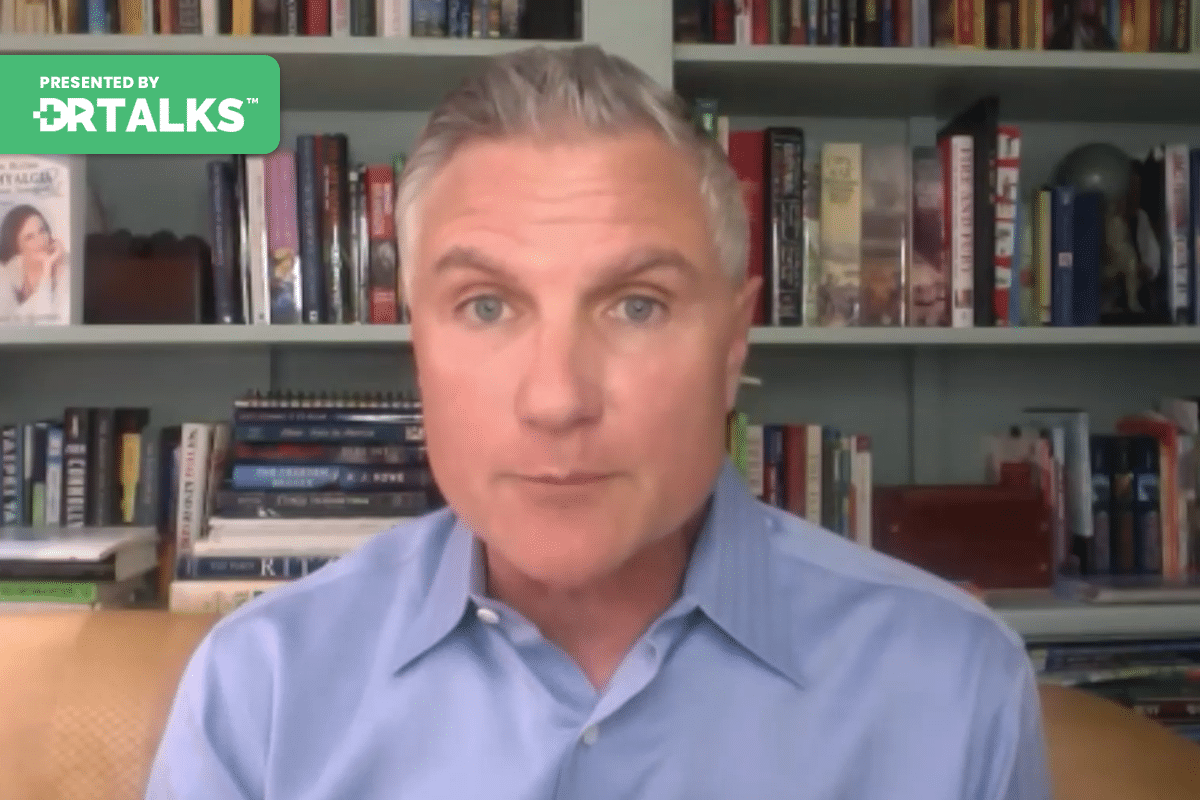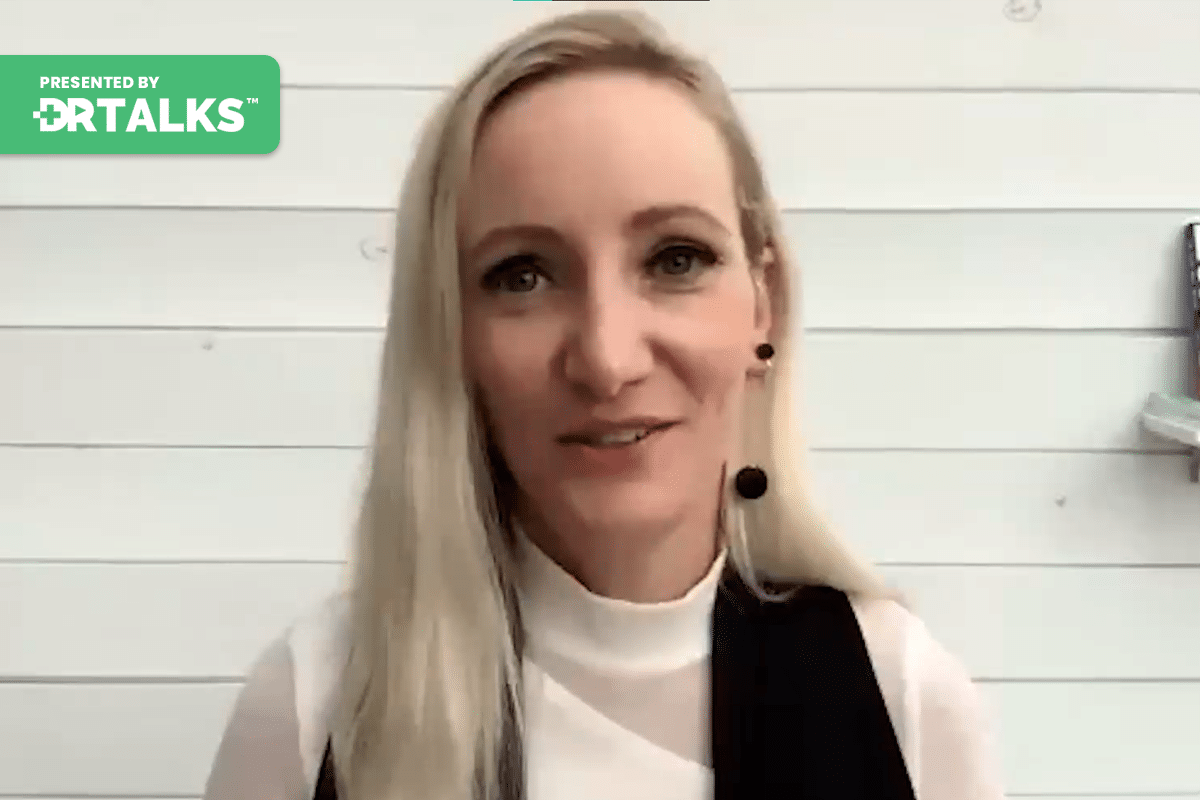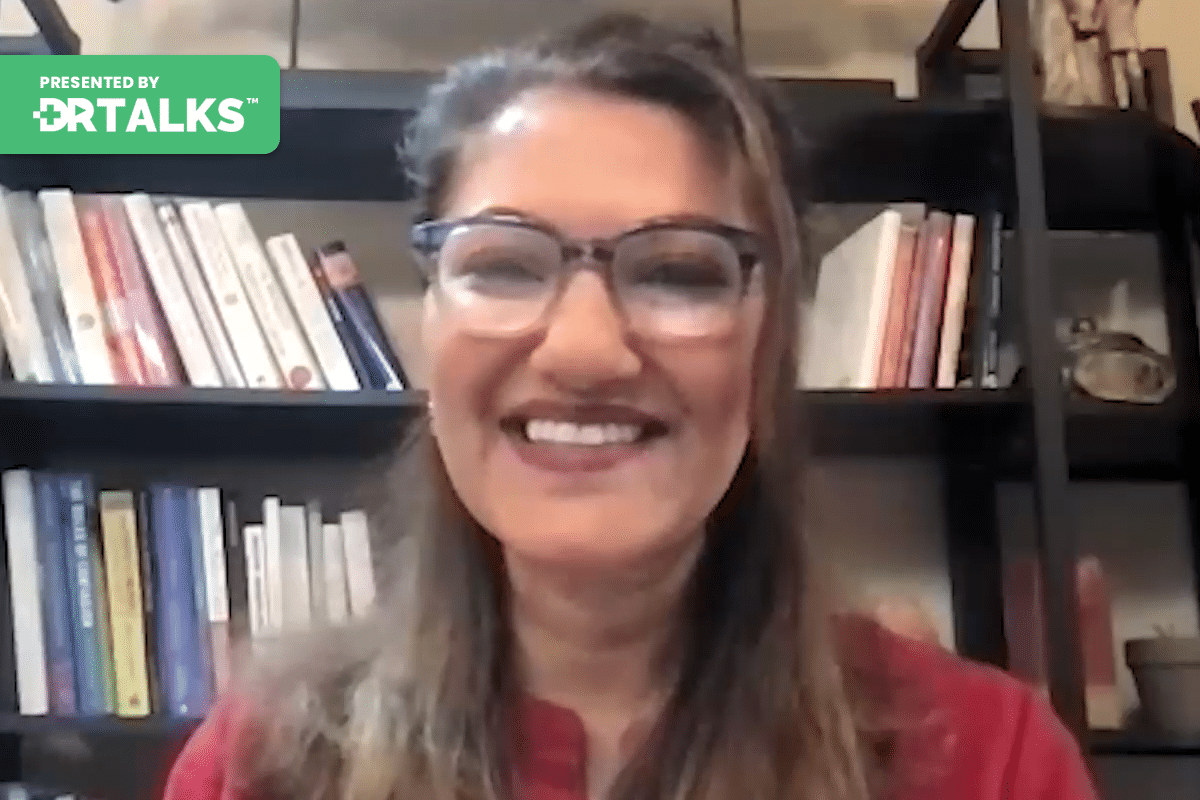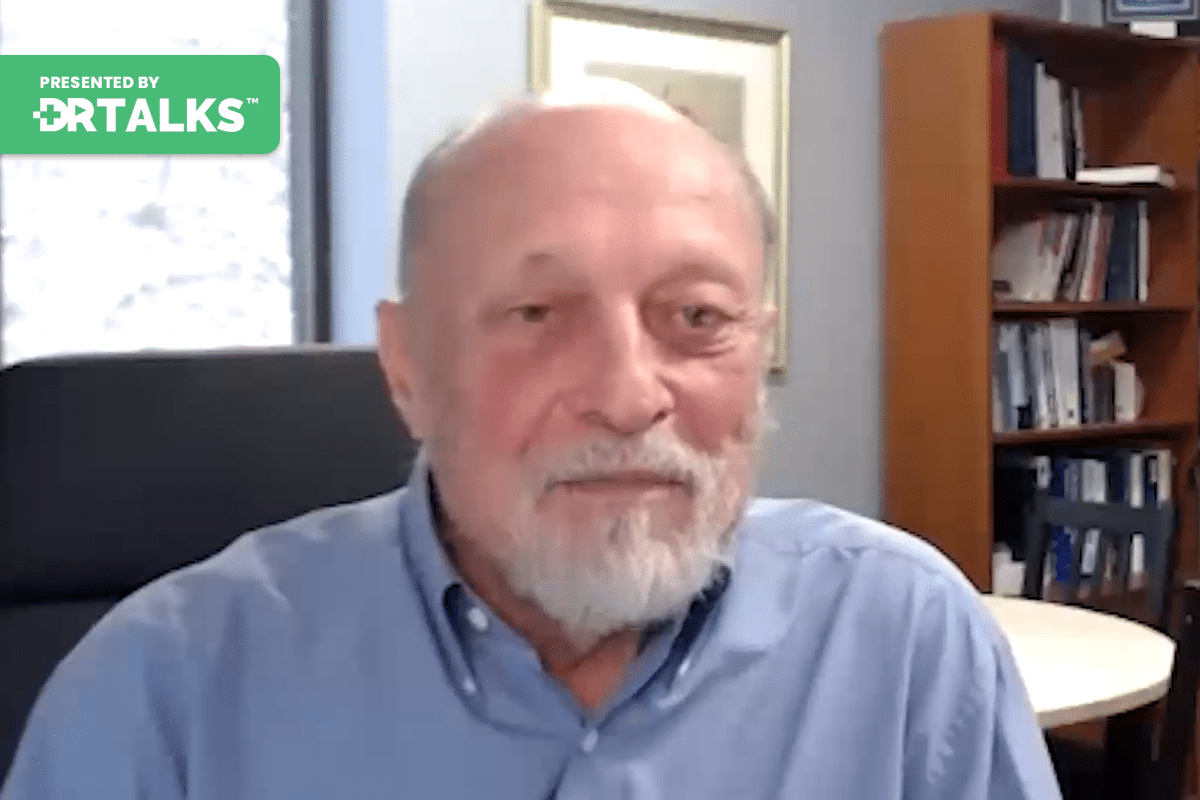Join the discussion below

Dr. Rodger Murphree is a chiropractic physician and board certified nutritional specialist. He is an internationally recognized fibromyalgia expert. His “Murphree Method,” a combination of functional and orthomolecular medicine, has helped thousands of patients get healthy and feel good again. He’s the author of 3 books for patients and doctors including... Read More

Dr. John Dempster is a board certified Naturopathic Doctor and Functional Medicine and treats a variety of patients ranging from high performance individuals to those dealing with chronic digestive disorders, auto-immune disease, and more. In addition to his busy practice, he writes regularly for a number of publications and lectures... Read More
- Good health begins with a healthy gut
- Solving GI disorders, a cause of poor health
- The microbiome is all the rage
Related Topics
Allergic Reactions, Autoimmune Reactions, Beneficial Flora, Brain, Brain-gut Connection, Diet, Digestive System, Ecosystem, Fibromyalgia, Functional Medicine, Gut, Gut Health, Immune System, Infections, Mental Health, Microbiome, Neurotransmitters, Opportunistic Bacteria, Pathogenic Organisms, SerotoninRodger Murphree, DC, CNS
Hi. Welcome to the Freedom from Fibromyalgia Summit. I’m Dr. Rodger Murphree. I’m your host. Thank you for joining us today. And I want to welcome my friend and colleague Dr. John Dempster, ND. He’s a board certified naturopathic physician in Toronto, has a very busy clinic that uses functional medicine focused on chronic disease, autoimmune disease, GI disorders, type two diabetes, fibromyalgia, chronic syndrome. John’s been on numerous summits with me and podcast and we always have a really interesting conversation. We usually dove pretty deep. Today we’re going to focus on GI health and the ramifications about the health of your gut dictates, the health of your overall body. So John, Dr. Dempster, thanks for being a part of the summit.
John Dempster, ND
Hey, Rodger, great to see you as always. Thank you for having me on.
Rodger Murphree, DC, CNS
You know, a functional medicine, so many speakers here are there philosophy is based around functional medicine where we’re trying to find the root causes of disease. And one of the primary drivers of functional medicine from the beginning and you know, Jeffrey Bland is gut health. You know, and I think sometimes people get sick of hearing about leaky gut and the microbiome. And but it’s a big cornerstone piece of everything we do in functional medicine. Right?
John Dempster, ND
Absolutely. And you know what, Dr. Bland is our hero in functional medicine. But this even goes back to the it’s used to serve is to say life and death begins in the now. So we’ve got to realize that this has been around for a long time, this ethos and this hypothesis that we’ve got to keep our gut in check for optimal health and well-being.
Rodger Murphree, DC, CNS
And why is that? Can you give us some examples? Can you tell us just kind of the basics about how the digestive system and elimination system work and then how they’re communicating with the rest of the body?
John Dempster, ND
Well, our gut, as we know, is literally from our mouth down to our record. There’s lots of little compartments and not so little compartments in there. And it’s comprised of a number of trillions of microbes in cells and all sorts of activity that happens there on a microsecond level every second of every day. And what we’re learning and this is what’s really fascinating right now, as you and I are both evidence based or evidence informed practitioners, and we really like to look at the science. So right now, the science and the gut space is just hockey sticking as we call in Canada, you know, going straight up in terms of the amount of studies and research dollars going into this. And why is that? Well, we see a huge connection to the immune system.
And again, many of your listeners, this is not going to be news to them hearing this, but we’re going to state this these principles right away, anywhere between 80 to 82% of our immune system does live in our gut if we have any form of an immune or an autoimmune condition, which is rampant right now, and nobody knows this better than you is, we’ve got to make sure that we are looking at reestablishing a proper gut ecosystem, a significant amount of our neurotransmitters are made in our gut, and this goes into many directions, not just mental health, but it goes into the directions of fibromyalgia, pain management and everything else that we are seeing and hearing a lot today.
But I used to be the host of it’s called the Mental Wellness Summit, where we would talk and discuss the science showing that about 90% of serotonin, up to 92% of serotonin, depending whose setting that research comes from. So your activity in your gut largely driven by microbial activity and there many other neurotransmitters. But as we know, serotonin is one of those neurotransmitters that helps with pain management and helps with mood support. And guess what? We’ve all been through a very rough couple of years globally right now. And, you know, a lot of people, serotonin levels have taken a big hit. We are actually seeing studies of research right now that if you go through a traumatic period of time or even a short window of trauma, it can influence your gut microbiome negatively within 24 hours. And so we are seeing surges right now of all sorts of mental health concerns. I don’t know about your practice, Rodger, but in ours for sure, largely compressed with a lot of the macro systems that have gone on in the last two years, going all the way back and so forth. But what we’re seeing is that if we can start to support that gut tissue, it starts to drive signals up through something called the vagus nerve. This is a nerve goes straight up to our what we like to say, our main brain or the brain that’s on our between our two years. But arguably our main brain is can be cited in terms of gut activity or in terms of neurological activity and are going to have. So there’s this highway of information that goes up and down this vagal nerve and we can touch on narrative if you like.
Rodger Murphree, DC, CNS
So talking about the microbiome or talking about you mentioned the ecosystem environment, what all makes up the environment, the GI environment, I mean, obviously bacteria good and bad, but there’s other things as well, right?
John Dempster, ND
There are. And, you know, we always hear abuse, but guess what? Not all yeast are bad. We have to have some beneficial use. We have to have some other not just we often think of bacteria as being bad, but we have trillions upon trillions of beneficial flora. Beneficial bacteria. There’s also parasites. There’s viral activity. There’s other possible molds and things that we are exposed to that if we are giving them the certain environment they can thrive, which we have to keep in check. And in terms of yeast and fungus, rather. And so there’s lots of activity going on in our gut that we have to be as mindful as we can in terms of supporting it. Because what we eat, and this is no surprise how we think, where we live, what we how we interact with our community, believe it or not, that actually has a role. These are all factors, among many others, that can start to change and adjust the ecosystem of our gut.
Rodger Murphree, DC, CNS
Yeah, it’s so there’s potential pathogens that are just sitting there. They’re, they’re opportunistic and normally they don’t bother us, they just cohabitate with the good bacteria. Normally they’re kept in check. But then when we get out of balance and that can come, as you’ve already mentioned, from different ways that can be from stress, which is really the catalyst for just about every chronic condition. But stress and inflammation and these autoimmune diseases can really sabotage the gears ability to do partly what it’s designed to do, which is communicate with the rest of the body.
John Dempster, ND
Absolutely. Yeah. And that’s that’s just you know, I like to kind of put these in different groupings. We’ve got are pathogenic organisms. These are the ones that often are disease causing. These are the ones that most people know something’s wrong when they have them. And, you know, these are things like charity and salmonella and so forth. And then we have this group of opportunistic bacteria. And these are the ones that I kind of equate to. Like, you know, if you remember ever going to a house party, there’s always that group of people that show up and maybe had one or two many drinks. And, you know, they’re normally good people, but when they get out of hand, they can break things and create a mess. So we don’t want to give them the opportunity. This opportunistic bacteria, to do that. They can create all sorts of disarray and or gut lining. They could create some disruption to the actual self function and they can leave debris that our detox pathways have to work, which are often working already hard enough, have to work overtime to deal with. And then we have the other group which are the beneficial for and commensal for that. So it’s a tight balance, it’s a tightrope. And, you know, we do have we are resilient because I’ll let you jump in here. But, you know, we often can sway a little bit this way too far. That’s when we have a problem.
Rodger Murphree, DC, CNS
Right. And you mentioned diet. I mean, you know, I talk a lot about all the time, whether it’s here on the summit or podcasts that I’m doing or presentations I’m doing for fibromyalgia for other folks. You know, the only way to overcome fibromyalgia and fibromyalgia is very much treatable. I hope you’ve learned that on the summit. Most of the speakers have. We’re in agreement on that. I think we all are in agreement on that. But you can’t get there without getting healthy. And I know that sounds and it sounds simplistic, but it’s really the truth. And you can’t get healthy with an unhealthy diet. I mean, there’s just no way around it. Eventually you’re going to have to fix that now. But part of the diet is having reactions to foods that you take in that normally would not give you any trouble, but may be causing allergic reactions or maybe causing autoimmune reactions. So our diet plays a huge role in the health of our gut, which then can dictate the health of the rest of our body.
John Dempster, ND
Food is essential. It is literally information that is sending so many directions every every moment of our being. So we’ve got to always make sure that we are eating the best for us. No, I know we’re all looking for that one. Magic diet, for that one magic supplement or medication that’s going to cure weather problems or insert whatever other condition. But there has to be some tailoring to that to to each person’s unique genotype and so forth. So, you know, luckily again, we’re exposed to different laboratory tests and tools and diagnostics in the functional medicine sphere that can start to shed some light into making some more customized and I would say more suitable discussion points in terms of what to eat. There are always the staples. I think we could all agree on some of those right now. And, you know, we hear a lot of about gluten for very good reason. We hear a lot about dairy or nightshades. And obviously a lot of the other proinflammatory foods that are found in processed foods are processed or ingredients found in processed foods such as sugars, artificial flavoring and so forth. And those are always essential. But we’ve got to do our best to try and nuance this. You know, I was so many patients originally when they come to see me, they’re on a lot of supplements, but they haven’t quite nailed their diet down. And we can’t supplement a bad diet or a diet that’s great for that person. So oftentimes, you know, it’s important to look at supplementation, but we’ve got to make sure that we distill that down to the absolute essentials and make sure you nailed down what you’re eating.
Rodger Murphree, DC, CNS
Now. So I think there’s two groups out there that are, you know, as far as diet. And one group is they’re just militant about what they eat. So they are no gluten. There may be a vegan, they may be whatever. They’re just really locked in a super clean diet. And yet they’re a little bit discouraged because they’ve been eating this way for a number of years and they don’t notice a lot of difference. So I think that, you know, diet, a clean diet is the long game. You have to clean your diet up really to be able to make the progress.
But supplementation and finding some of these other root causes is a little bit of a shorter game if you can release some of the linchpins, whether that’s a problem of your thyroid or mobile toxins or something that you discover in testing and fix that, then now you start to see the diet eventually really make a progress. And then the other side of the coin is the folks that just have, you know, tried to do these different guys and they’re just like, you know, like most people. I mean, there’s so many different choices out there and we don’t have time to go in depth about the different diets. But what in your practice it seems to be.
John Dempster, ND
What.
Rodger Murphree, DC, CNS
What seems to be the best diet for your patients across now everybody’s different. I know my practice it’s specific for that person but is there diet that you kind of like more than others?
John Dempster, ND
Yeah, we definitely have a foundation from that. And you know, some of that is what I decided. It’s more of an anti-inflammatory protocol that is very, very minimal on grains. We take it, as we’ve done, have been very fortunate to be part of some research done at Harvard where they’ve shown that a lot of the activity, even with some of the gluten free grains, we have to be very careful. And a friend and colleague of ours is, as we both know, Dr. Peter Osbornes had written a great book called No Grain Fed and, you know, I would say that there’s still some merit to that. Now, I do find that eventually I can get in there. We can often find that caveman buckwheat brown rice can be introduced. But at the beginning, when we’re trying to overcome this giant hill, at first, as you say, the diet is a long game. We’re not looking for a quick overnight fix. In fact, some reactions. Many people say, oh, yeah, I tried that gluten free thing or I tried that great using. You know, it didn’t work in a week. And I’m like, Well, let’s talk about that.
So, you know, this is we have to make sure that we are setting reasonable expectations and you nailed it. Like this is also not something that people are going to feel for for many months in some situations. And it is the shell game. But the more insights that we can look at in terms of understanding inflammation in the body and how that interacts with the gut lining, which comes back to what I do with my clients, we actually we will measure our patients foods. So I’ve always got this sort of approach where we say, look, here’s my base anti-inflammatory diet, we cut out gluten, we kind of nightshades, we cut of dairy, we cut oats. Sorry. I know it sounds like we kind of every bit of fun out there added sugars, but there are so many. And then we have a nutritionist that we have our patients work with that helps to create foods that they can eat. We want this to be a can do, not a can’t do something approach. We want to empower them with.
We’ll say, Hey, I’ve just never tried these other types of groups, but then we often will test foods. Now again, food testing is fraught with inconsistencies, but you can find labs that are going to be helpful. I can give you some further insights that we can bring in and nuance that treatment plan, because as we discussed earlier, you know, it’s a food reaction isn’t always an allergy. That’s a quick overnight thing. It can sometimes be days, weeks later for them to actually feel an impact from that. And it can be widespread. It’s not just about pain. It can be mood, skin, digestion, could even be joint pain, so forth. And so we do want to make sure that we’re providing our patients with as much tools to distill and customize their current.
Rodger Murphree, DC, CNS
Now, in your practice, do you do food allergy testing? Do you do Eliza test or our cat or elimination diet? What are some of the some of the things you turn to to help to find. Okay. Gibran’s meat was not all of those. Yeah.
John Dempster, ND
Yeah. We don’t do all the books for everybody, but all the above are at our disposal. We will often you know, the types of antibody tests and there are more than just the typical allergy IgG antibodies there. There’s agent AGM, IgG and we will leverage in some sense situations in instances what those antibody immune reactions are doing in each person to the existing. Yeah.
Rodger Murphree, DC, CNS
You know I see a lot of patients that as are going through this this journey this chronic ill health journey, they’re trying to figure things out, but they find that their diet becomes smarter, you know, more, more limited, more limited, you know, and they get to where they’re down to just a few foods and that it shows you that that that you know, these toxins as they build up in your body, you become more and more sensitive to things, whether that’s a food allergy or food or bright lights, noises, you know, things that you never really thought about, smell. So you never had a problem. And now you’re starting having these issues.
It’s because the body’s just not working like it’s supposed to. It’s really stressed out and has become overloaded with toxins and I do food allergy on every patient, and I didn’t used to do that years ago, but I had a patient that I did eliminate always the elimination diet and I highly recommend that. But she was doing fantastic and had are doing really well. I had her elimination diet and about three months into a program she started adding back foods and she had all these fibro flares. And that’s typical in fibromyalgia patients. You know, they get under stress, they can initiate a flare. But I couldn’t figure out what was going on because it really wasn’t that she’d really eliminated a lot of stress in her life.
And what we narrowed it down to is every time she ate eggs, she had a flare. And that was enough for me. I mean, it took a month. I hate to admit it took a month to figure that out, but every time she ate eggs, she had this intense, diffuse, achy all over pain and brain fog and ever since, I just that’s just to me, that’s low hanging fruit. If you can do it and you’re not 100%, as you know. But if you can do a test that will give you some clues about what they should not be putting in their body, that can be incredibly helpful.
John Dempster, ND
Eggs come back a lot on the testing we do and we see and you know, there are I was explaining to my patients there’s not a perfect food test yet. They have to still interpret it. We have to understand there’s still false. False positives and fortunately, there’s not usually false positives with dairy, gluten, eggs, etc.. But we have to make sure we’re interpreting that data and making sense of that to each patient. It’s so important that we don’t just say, Oh, that’s the only screw that I have to avoid or the only foods that I can eat. We do have to bring it all together.
Rodger Murphree, DC, CNS
You know, with autoimmune patients and fibromyalgia may not you know, it’s debatable whether fibromyalgia is an autoimmune disease or not. Some of us think there’s certainly enough smoke that we think maybe we can find the fire one day. But with autoimmune disease, the first thing I always think about is why is the body attacking itself? So if you look at a lupus, you know, our rheumatoid arthritis, either true autoimmune disease, Hashimoto’s, you know, why is the body attacking these tissues? Why would they want to do that? And if we look at the research, oftentimes we see one of the common denominators is this thing called leaky gut. So here we are talking about leaky gut again.
And on every functional medicine oriented type of summit or podcast, leaky gut is going to come up and people kind of, you know, and I’m guilty of it too, kind of rolling my eyes sometimes about it. But really, it really is the foundation, if you’ve got it, that’s not right. Every time you’re eating something, you run the risk. You’re generating these inflammatory chemicals in your sabotaging, as you said, the body’s ability to to generate these neurotransmitters to communicate with the brain.
John Dempster, ND
I would agree. Yeah. And, you know, we have heard about this for a long time, but it’s the you know, it’s for the right reasons that, you know, if we don’t fix that, that’s the foundation of your healing. We’ll be able to have some quicksand. It’s just not going to be sustainable if we’re just trying to put the fires out where they’re trying to address where the flames coming from and so we do want to make sure that we are assessing that.
Thankfully, there are tools that are available to give us some insights into intestinal permeability known as leaky gut and give us an idea of how much focus and attention do I need to give to that area right now, if we continue to allow things to seep into our bloodstream, such as undigested food particles or different microbial material, another toxicity compounds, toxic compounds. We’ve got to realize that that is only going to fan the flames of any form of chronic pain syndrome or chronic autoimmune condition. These conditions are not usually caused by one thing. They’re caused by a perfect storm, like a hurricane coming from all tiger, all these storms coming together into one big storm. So we have to start to isolate each little micro storm. And if we do that effectively, I think we’ll see improvement.
Rodger Murphree, DC, CNS
And in this community, fibromyalgia, we know about 70% of those fibromyalgia have irritable bowel syndrome, which is another syndrome that really means nothing other than you have stomach pain and bloating and gas and you may have diarrhea or constipation or go back and forth. Otherwise, it’s just a name, right? Like kind of like fibromyalgia. But there’s definitely a connection, right? And you’ve already pointed out the neurotransmitter serotonin, which is crucial for these folks, because when it’s depleted, when it’s low, we know they have a lower pain threshold. They can’t block this thing called substance P, which generates increased neurological activity. That makes it makes any kind of stimuli more more pronounced. Do you find with your patients? Yes. There’s a few things that you can do really to kind of shore up any kind of irritable bowel symptoms. I mean, is your go to I’m sure you and your G.I programs and stuff. I know there are, but just so we can have that conversation. What are some things you recommend to help individuals with irritable bowel kind of get that situation under control.
John Dempster, ND
Throughout and it’s interesting you mentioned this. This is why I created a program literally called Yeah, We’ve Got Institute and it’s literally to help people with IBS type symptoms and anybody with gut issues. So some of the common themes like we have a seven module portion of this that breaks it all down, but we really want to get in there. We want to reseed or recolonize the beneficial floor. We want to get rid of the inflammatory foods. We want to remove any form of invaders such as yeast, bacteria or parasites. Now, yes, we can measure these and we do that with our patients that come in for that one on one care.
But oftentimes we will find that people will benefit in general when we remove and reintroduce and re inoculate our microbiome and balance it out. So there’s so many other variables there that are helpful, but those are just big, easy, quick, quick wins for anybody listening. Right. Well, there’s many different strains of probiotics or companies with different strains of probiotics that are available out there. There’s many different antimicrobials, you know, always try to to work with somebody. But if you really try to get the best quality products you can, that can help, that can make all the difference, because not all probiotics are created equal and many of them are wrought with ineffective delivery systems and so forth or ineffective dosing strains.
So we do want to make sure that we’re investing into quality products. Oftentimes you can know that you’re doing that just by the cost. You go to any health food store, you can see there’s a wide array of costs, but there’s usually a reason for that. So, you know, if you’re now working with somebody one on one, you’re making these decisions by yourself. Really do make sure that you’re investing in higher quality products.
Rodger Murphree, DC, CNS
And there’s a lot of good suppliers out there. I mean, there’s a lot of wonderful probiotics out there now. I tend to lean a lot times more towards for probiotics because of the fact theory. Indestructible. Doesn’t matter if the individual is taking a probiotic, they take it on an empty stomach. They can take it. It really doesn’t matter. And they seem to really work really well. What about you? Is that one of the probiotics you kind of lean to?
John Dempster, ND
We often do both. We still do. Yeah. So I find that I still store probiotics are very helpful. They tend to be a little bit of the cutting edge right now in terms of the research process. But yeah, I still find that I want to get into the hundreds of billions of counts in some situations and often we can’t quite hit that just with this for or probiotic all by itself. So I have to alternate and mix different probiotics at different times, depending on patient, of course.
Rodger Murphree, DC, CNS
So I think the probiotic routine regimen is very, very important. But I also really think for IBS, just starting with a good digestive enzyme, so many people, I think after the age of about 30, if you’ve eaten a lot of processed food and foods that really aren’t real foods. So these are foods that, you know, manmade foods that don’t have any enzymes in them like fruits and vegetables. Eventually your pancreas becomes compromised or you lose your stomach acid. You don’t have enough stomach acid, so that food just sits there. So I really think for me, starting with a digestion enzyme is crucial. And then I find that my patients who are constipated so who have ABC most of the time it’s just they’re too deficient in magnesium, which is a natural muscle relaxer, but it also relaxes the current definitely.
John Dempster, ND
And it’s the number one deficient nutrient in humans and it certainly is up there in terms of relief for constipation. So, you know, we often hear your listeners really get the sense that we do a lot of testing with our patients. We do, you go back to the pancreatic conversation. When I’m doing this comprehensive stool analysis with each patient, I virtually do it with each patient. We often see a deficiency, what’s called the last case, one in the last one is indicator of pancreatic function. And if we have an insufficiency in the pancreas, we have to make sure that we’re supporting that with enzymes. So it’s a very good assumption that almost everybody could benefit from some digestive enzymes with pancreatic support. Specifically.
Rodger Murphree, DC, CNS
Do you normally start folks on betaine hydrochloric acid or do you just go right to more of a pancreatic type of enzyme? Okay.
John Dempster, ND
I will start with that insertion.
Rodger Murphree, DC, CNS
Yeah.
John Dempster, ND
I will start with an enzyme only because not everybody tolerates the botanical.
Rodger Murphree, DC, CNS
Well yeah. Same, same.
John Dempster, ND
And I do think it is an important step but sometimes when you have a new patient, you want to make sure that we don’t make them feel worse because they’ve come into the clinic feeling pretty crummy. And so eventually what will challenge the hydrochloric acid levels with betaine HDL? But for anyone who’s listening, who’s tried this before and you’ve taken too much, you know what I mean? You feel like you’ve got this heartburn and you feel it’s not a pleasant sensation, is not dangerous if you reduce that right away, but it can be very unpleasant. We don’t want to rush that initially. We’ll push that up later.
Rodger Murphree, DC, CNS
Now, people are often told when they have reflux or heartburn this, that they have too much stomach acid. But you and I know that may not be the truth. It may be the other way around that actually having symptoms of heartburn or reflux because they don’t have enough stomach acid.
John Dempster, ND
Kind of present.
Rodger Murphree, DC, CNS
Yeah. So you talk.
John Dempster, ND
To your doctor because you still with the HCA, which is a very common way to improve stomach acid. If you move that acid too quickly and it gets into the areas that are irritated and they haven’t healed properly yet, you can still notice some irritation, but it is certainly I would say I actually agree with that. KM Rodger, is that we’ve got to make sure that we don’t have a hyper carbohydrate situation which is very common. And we can often see that when we see multiple nutrient deficiencies upon our testing and multiple different types of just biotic, which is a term that describes an imbalance in our beneficial bacteria, if we see some deficiencies in nutrient levels that are excessive and we see excessive amounts of this biotic behavior in our stool testing, it’s almost certain that we’ve got a hydrochloric picture.
Rodger Murphree, DC, CNS
Now, you mentioned the vagus nerve, which is really important for these folks because their sympathetic nervous system is over. It’s over, generating a response all the time. They walk around, wired and tired because their parasympathetic nervous system is pretty much dormant for these folks. Unfortunately, because of this central since it’s central central sensitization pain syndrome, that’s such a I always get a tongue tied on that, but we see that that imbalance can really create some problems. And one of the ways that you can start to fix that, to balance it out, is tapping into the vagus nerve.
John Dempster, ND
100%. You know, we’ve got as you said, you know, we’ve got the parasympathetic and then we’ve got the sympathetic, which is the fight or flight versus the rest and digest. And I always explain to my patients, you can’t have one foot in both. You’re in one side or the other. And most of us are trapped in that fight or flight response, whether we’re, you know, dealing with a busy household or work stress like stress disease, stress illness. And it’s very oftentimes we we have to find a way to get them back into that parasympathetic can get them out of that trapped state that they’re in, that their body now receives signals to heal.
Because especially when we’re coming at this from a gut foundation, foundational healing perspective, we’re not going to heal that gut running if we are constantly in that sympathetic fight or flight dominant state. And it’s okay to have bursts of that. We are we’re programed to have burst. But with the recovery period and if we don’t have that recovery period, we’re constantly bursting over here, then we are going to eventually it’s going to catch up to us and it’s going to give us.
Rodger Murphree, DC, CNS
So some of the speakers that are on here have talked about some of the things you can do, the exercises to help stimulate the Pacific system and the vagus nerve. What really seems to work for me is breathing exercises for my patients. That seems to work. It’s easier something to do. But I also really encourage the patients I’m working with one on one to do an hour power every day and it could be half an hour or whatever that is. But just making that quiet time to where you can really kind of get in touch with your body and what is trying to tell you, get in touch with your spirit. Just that alone can be a dramatic improvement in bouncing out this overactive nervous system.
John Dempster, ND
I love that we can’t all unfortunately retire at this age. Really. We have responsibilities that we have to own up to and continue to trigger our stressful responses. But at the same time, we can manage these better and you know, we can do that with daily practice and mindfulness and so forth. And it doesn’t have to eat up your whole day. You know, you touch on one that I actually tell every new patient, no matter who they are. And I haven’t even seen the lab values. Every new patient that walks in my door. I cite a study done based again through some Harvard research that shows that if you do ten consecutive deep breaths and you do that once an hour throughout your waking day, you will buffer the impact of stress by up to 40%.
Rodger Murphree, DC, CNS
Wow. Wow. That’s impressive.
John Dempster, ND
So easy, so simple. And it doesn’t take any time out of your day. So very quickly, we can lose any of the usual knee jerk excuses or I don’t have time or customers doesn’t study you take it with you anywhere. And my busiest people that I work with are really enjoying just that simple exercise. Yes. Power hour. If we could do that, we would be way healthier. But that’s something that we work towards because often times, as you know, there’s a lot of people I can’t because of this, I can’t because of that. So we try to get some quick wins under the belt, get some momentum going, and then we work on to the next step, which is mindfulness or meditative states exercises.
Rodger Murphree, DC, CNS
Yeah. Are there any supplements that you like that you might want to throw out? Some names of, some things that you normally recommend kind of as a way to to nurture your gut, to keep it healthy, not so much as a focus on a treatment. You know, we don’t have time to go into those, but there’s some things out there that just really are just good things to take, maybe even periodically, just to really help that gut to be healthy.
John Dempster, ND
Where you can’t get away from probiotics. I’m going to say that right off the bat. Yeah. And I also like to try and vary them over time, too. So different products, different strains, different cultures. So probiotic is number one by far, keeping an eye on your fiber content is key. And, you know, we hear a lot about fiber. It’s not just about psyllium and Metamucil anymore. It’s about looking at all the insoluble, insoluble fibers together. These are often the fertilizer for those probiotics to flourish. These are the prebiotics. And so making sure that we’re getting enough fiber, whether it’s through our diet, which lawfully most North Americans are very, very low. And we need to get that up. So oftentimes we’ll supplement with that. I do love how glutamine I think our glutamine is a wonderful nutrient. It really helps seal those tight junctions that are off to become leaky, as we’ve inferred to earlier. And it really allows us to create a much more integral gut lining there so we can do some of that testicle ability.
So those are those are very quick, easy wins right out of the gate. And I do love certain key nutrients. I do love something like five HTP, which is a serotonin supporter and we have so many serotonin receptors in our lining that oftentimes that it is a very key step as well to initiate some healing. But we will find when we do our labs where they’re deficient minerals B vitamins, any oxidants. And so many of those do have rules and they got that, you know, they never go wrong by promoting a high powered or plant based multivitamin or some form of a formula that contains that in a powder as well. I do love those things. Just to kind of cover a little of a lot until we get some very specific treatments in place.
Rodger Murphree, DC, CNS
So five htp, five is actually tryptophan when combined with synergistic vitamins B, vitamins, magnesium, vitamin C, that turns into serotonin. That’s where serotonin is brain chemical and hormone comes from. And in the literature, it says that if you take five HTP, it may increase loose vomits. Now I have never see that I see them. Yeah. Okay, I get it. I whenever I’ve got somebody with irritable bowel a which they go back and forth between loose and constipation or hear about D was loose. What I find if I can get that serotonin level up and with the five htp that oftentimes that stops those loose movements. So it’s a little bit conjured, a little bit of a contradiction to what you see sometimes in some of the literature out there. But that just solidifies what the real world is like. You know, if you got somebody like like Dr. Dempster or myself that’s in the trenches everyday working with patients, I don’t care what the literature says, if it’s working.
John Dempster, ND
And it’s.
Rodger Murphree, DC, CNS
In a safe, we’re using it. And that’s what I learned early on about five HTP. I use it, you know, across the board, not fibro patients, but I see it can be really helpful because serotonin controls how fast or slow food moves through your intestinal tract. It controls the motility and five htp. If it’s low, you’ll see that food just kind of sits there. You become conscious, you know, you become constipated. I’m sorry. When you get under flare, you start to have these loose bowel movements. So obviously B can be very, very, very helpful. Yeah.
John Dempster, ND
And also it just makes you feel better, right? If we again have that balance between the vagus nerve and everything that’s happening up top in this brain, it happens down in this brain and vice versa. There is a need for loop and it really helps create momentum for a lot of people because most people, when they’re sick, they’re not feeling their best mood, they’re not feeling their best energy. Best. Right. And we want to make sure that we’re supporting every aspect to keep that progress going, because As I always sign off on all of these talks, I say, look, it’s not about perfection. It’s about progress.
We always want to make sure that we don’t panic if it’s not going perfectly the beginning and you’ve given a bit of glutamine, you know, you’ve got you got in a fight with your spouse or your coworker or whatever it might be. Don’t worry about perfection. Take that off the table. That’s going to be the antithesis of healing. But focus on doing one thing better each day and moving forward. And that’s going to have a compounded interest effect in months and possibly a year later, you’re just going to see those small changes truly stacked up. So.
Rodger Murphree, DC, CNS
John, I wish we could go into more detail. I wish we could, you know, we had more time. But I want to make sure they can learn more about the disaster clinic, learn more about you. We’ve talked a lot about the good gut program that you’ve got to keep through the name, but I’ve had I’ve had access to it. It’s really well thought out. Well done. Where would they go to learn more about you? And in some of these things we’ve talked about, sure.
John Dempster, ND
Well, they can first of all, I can jump on my Web page, which is the Dempster clinic dot com, and I’m sure you’ll have a link there for easy access. And if you want to learn more about our health to go to institute, that’s my online program that just again is a foundational step off point for anybody dealing with chronic illness, especially in the autumn. Should it go to space. And we’ll be a dropdown in that on my website there for now. So you got it. Student Or you can just do it. But there’s take advantage of all our free resources, videos, articles and so forth. You know, we really just want to make sure that people are getting the tools to initiate. They’re going to get things rolling in so that they can work with the practitioner like you and find somebody in their area that’s helpful to really start nuance and create that individualized component to it.
Rodger Murphree, DC, CNS
Yeah So hopefully, you know, Dr. Dempster and I, we really gave you some things to think about and this is, you know, this is just kind of the beginning of the journey for some of you with some GI problems and also just for fibromyalgia. So there are a lot more out there to be had. I understand that. But if this resonates with you, then I want to encourage you to continue learning more about how your GI system affects your overall health. It really is fascinating. And Dr. Dempster does telemedicine as I do, and he’s got a lot of free resources on his side, as do I. They can help you navigate some of these GI things. John, thank you so much.
John Dempster, ND
Rodger, it’s always a pleasure and thank you for doing what you do. And this is a great event.
Downloads

